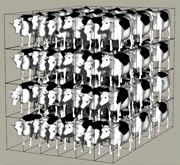Animal Science, Department of

World Congress on Genetics Applied to Livestock Production: 3rd (1986)
Date of this Version
1986
Abstract
The influence of some elements of tropical milk production systems on breeding objectives is discussed. Expansion of demand for milk and meat should be expected from increased population and income growth. Relative commercial value of milk fat may be strongly influenced by government policies regulating to proportion of liquid milk consumed. Calf production is an integral part of cow performance under the common practices of hand milking and suckling. Milk letdown may be an important trait for milking in modern dairy parlours. Experimental economic evaluations have referred mainly to comparisons of breeds and crosses, indicating that European × zebu crosses out performed purebreds in the environments studied. An evaluation of milking time in relation to milk yield of crossbred groups is presented. Results from a simulation study on tick control strategies allowed evaluation of genetic change in tick resistance.


Comments
Published in 3rd World Congress on Genetics Applied to Livestock Production, edited by Gordon E. Dickerson and Rodger K. Johnson, 4 vols. (Lincoln: University of Nebraska Institute of Agriculture and Natural Resources, 1986). Copyright © 1986 Board of Regents University of Nebraska.